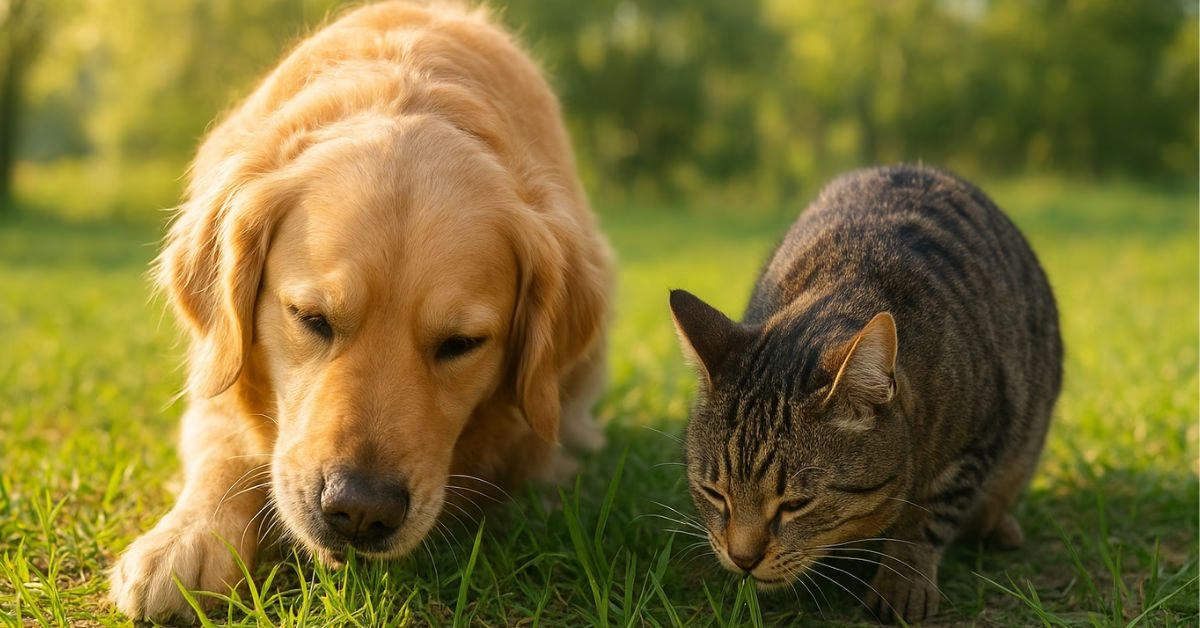Grass is not digested, but why do they eat it? The digestive system of dogs and cats is not designed in such a way that they can get nutrients from eating grass. Still, they eat it. This is their natural instinct. A natural way to remove toxins accumulated inside the body.
What to do if they have an upset stomach or indigestion?
Dogs and cats eat grass when they have indigestion or an upset stomach. They vomit immediately after eating grass. As a result, unwanted substances are released from the body.
A study in 2008 showed that some dogs were seen eating grass almost every day of the week. Many of them had stomach problems or minor illnesses in advance.
Self-cleaning technique
Cats have a strange habit—they repeatedly clean their bodies with their tongues. This causes dead body hair to go into their stomachs. If this happens for a long time, hair accumulates in the stomach and forms a lump, which causes problems in the digestive system.
Grass helps them in this case. After eating grass, they vomit and expel the hair. A study in 2021 found scientific evidence for this behavior.
Wild animals also eat grass, not just pets ?
Not only dogs and cats, many wild animals in the forest are also sometimes seen eating grass. Because parasites often settle in their intestines. So they eat grass and vomit out those parasites.
Is grass nutritious?
Everyone knows that grass does not have any significant nutritional value. However, according to Lori Taylor, a professor at Texas A&M College, grass may contain some micronutrients such as vitamin B. But doctors are reluctant to accept the claim that dogs and cats eat grass for this reason.
According to them, the main reason for this behavior is not nutrition, but relieving discomfort.
Are all grasses safe?
This is where the danger lies. In general, eating grass is not harmful, but grass treated with fertilizers or pesticides can have serious effects on the body of dogs and cats. Poisoning, vomiting, diarrhea, and even long-term liver and kidney damage can occur.
Therefore, pets should always be kept in mind where they are eating grass. If chemicals are applied to the roadside or in the garden, pets should not be allowed to play or chew there.
When should you worry?
If your pet vomits repeatedly after eating grass, loses its appetite, becomes lethargic, has stomach pain or diarrhea, then it is imperative to contact a veterinarian if such symptoms occur.
Where are the roots of instinct?
Dogs are originally descendants of wolves. Wild wolves sometimes had a plant part in their diet. They also ate semi-digested grass or plant-based food from the stomachs of hunted animals. As a result, many experts believe that the tendency to eat grass is in their DNA. Cats are completely carnivorous, yet they instinctively tend to eat grass occasionally.
What can the owner do?
Observe the pet’s behavior – there is no problem if it eats grass occasionally, but pay attention if it is frequent.
Ensure safe grass
Chemical-free grass or ‘cat grass’ (a special type of grass available in the market for cats) can be given.
If excessive, go to the doctor
if there is vomiting, diarrhea, lethargy, etc., take it to the veterinarian without delay.
Give a balanced diet
Sometimes they can eat grass even if the food lacks fiber. Make changes to the diet on the advice of the veterinarian.
Although we have many questions about dogs and cats eating grass, there is nothing to be alarmed about. This is a completely natural habit that has been part of their instinct for many years. However, not all types of grass are safe for them.
So if your pet eats grass occasionally, there is no reason to worry. But if it happens repeatedly or if you get sick after eating grass, be sure to consult a doctor.

Hi, this is Admin from Indnexa. We publish content here that is authentic and has value for our readers. We do not mislead our readers by publishing fake news . We cover news related to Entertainment, Sports, Investments, Health, and so on. Providing the best news for our readers is our main motto. With a keen eye for detail and a drive to inform and inspire, we try to transform complex ideas into accessible content for curious minds.

